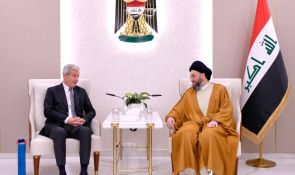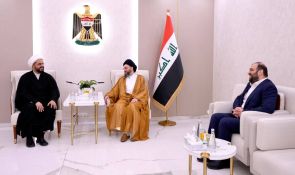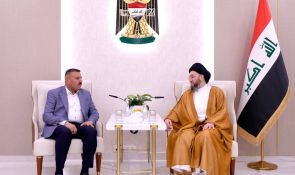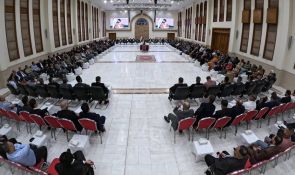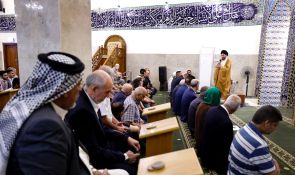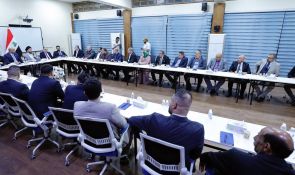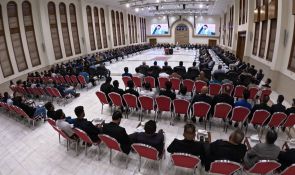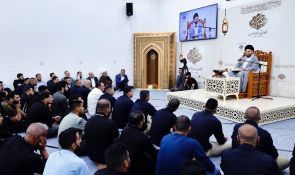Sayyid Ammar al-Hakim calls for direct dialogue between the Arabs and Iran and stresses the importance of finding a strategy between Al-Azhar and the Religious Authority to confront extremism
Head of the National Iraqi Alliance, Sayyid Ammar al-Hakim, called for opening of a direct dialogue between the Arabs and Iran, expressing Iraq\'s readiness to mediate if requested, stressing on the importance of finding complementarity relation between the religious authority in Najaf and Al-Azhar in Egypt in order to a unified intellectual and religious strategy to eliminate extremism and terrorism.
\r\nDuring an interview on the On-Live Egyptian television channel throughout the Cairo visit of the National Iraqi Alliance delegation headed by Sayyid Ammar al-Hakim, his eminence stated that they seek to transfer the Iraqi-Egyptian relationship to a new space, and to make a strategic relationship between the two countries, noting that \"Egypt is distinguished by its independent political decision, and we can guarantee that Egypt position will be in favor of the Arabs, noting that \"the Iraqi experience was faced with many concerns and doubts by many Arab and Islamic countries, therefore we are interested in an independent decision, unbiased and accepting of the composition of Iraq to come out with a vision that serves Arabs and Muslims.\"
\r\nHis eminence stressed the need to transfer the economic relationship between Iraq and Egypt to a wider area of trade, pointing that the energy transit countries are complementary to the countries of production, and we need a real involvement of the transit countries as we have great strategic horizons with the near pumping of oil into Egypt.
\r\nHis eminence said that Egypt\'s facilitation to grant travel visas to Iraqis will lead to a major development in Iraqi tourism in Egypt
\r\nHis eminence expressed the desire of Iraq to rise again and restore its role in the Arab world and the regional and international space. Egypt is the element of regional balance and an important portal and not sensitive to the diversity of Iraq, noting that \"political integration established the Arab League decision, and an integrated decision could have avoided many countries current tension, including Syria, Yemen and Libya, adding that \"the political situation of Iraq and Egypt towards these countries and crises is a mutual position.\"
\r\nRegarding military and security cooperation between Baghdad and Cairo, head of the National Iraqi Alliance stated: \"There is no doubt that terrorism and terrorist challenges represent the biggest concern in the region and Iraq. Iraq is the most affected country and most benefited for the accumulation of experience in the face of terrorism and 13 years of a fierce war and the last 3 years we reached the peak of this war and the conduct used by Daesh. Most countries of the world and the region are not prepared by a military system to face this type of enemies citing security breaches in Western countries and other locations. Iraq is willing to provide this experience to Egypt stressing on the essentiality and necessity of intelligence cooperation.
\r\nHis eminence stressed the need for two pillars of moderation in the Arab and Islamic world, namely the religious authority in Najaf and al-Azhar in Egypt, means to integrate the two sides and develop a unified intellectual and religious strategy to eliminate extremism and terrorism.
\r\nRegarding the battle for the liberation of Mosul, Sayyid Ammar al-Hakim stated, \"It was possible to liberate Mosul in a way similar to liberating Aleppo by evacuating the people and turning the city into ruins and then liberating it after two weeks, but the government decided to keep the people on the battlefield, save lives of civilians and minimize human and material damage. The continuance of the battle for two month is because the soldiers\' attention to avoid harming the civilians, and the forces did not spare terrorists with any escape route. \"
\r\nRegarding the popular mobilization forces his eminence indicated, \"the adoption of the popular mobilization forces law provided legal covers are to make it a part of the Iraqi armed forces, and will be restructured, and includes all the components of Iraq.\"
\r\nHis eminence touched the subject of Kurdistan region independence indicating \"The present circumstances do not support creating provinces not in terms of the internal structure of Kurdistan and the size of economic, political and security problems faced by the region, and not in terms of the Iraqi equation fragile conditions, and not in terms of regional and international circumstances, and I personally do not know a country other than Israel that could recognize a Kurdish state at the moment, and we were assured by many sides that they undoubtedly support Iraq\'s unity, stressing that \"all Arab countries keen on Iraq\'s unity and fracture of Iraq will drag to the Arab region, and fracture of Iraq will not stop at the Iraqi border, but will pass to the Arab region, there are no Arab interests in line with the Kurdish aspirations, yet we understand and appreciate them.
\r\nAs for the presidency of the National Iraqi Alliance and the selection of a new president, Sayyid Ammar al-Hakim stated that Iraq has become democratic and open and this is its power, there is an immunity to the Iraqi people when listen to all views, and we are not political amateurs and adolescents in the political situation, we anticipated the occurrence four months before the end of the presidency tenure of the National Iraqi Alliance, and it is an unprecedented situation in Iraq, but we want to contribute to the institutional construction. \"
\r\nRegarding Arab-Iranian relations, the head of the National Iraqi Alliance called for defining spheres of influence, opening a direct dialogue between Arabs and Iran, and not looking at Iran as an enemy.


